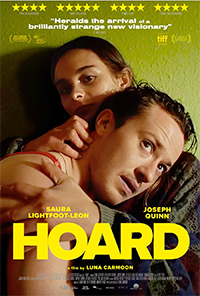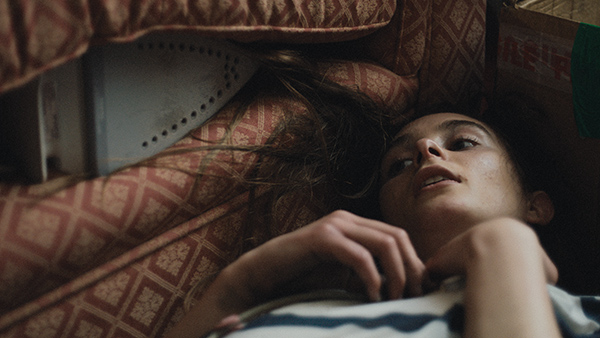M is for the Many Things You Gave Me: Grief Becomes the Remedy in Carmoon’s Debut
 “Time heals all old pain, while it creates new ones,” states a Hebrew proverb, implying the distance from grief may court closure while carving out its own rippling chasm of hurt in the inevitable process. The constricting power of grief is at the center of Hoard, the peculiar debut from director Luna Carmoon. In essence a tale about a dysfunctional mother-daughter bond defined by a parent’s hoarding disorder, Carmoon’s psychological portrait of how the past can suddenly overwhelm the present is familiar but often unpredictable with its trajectory toward unavoidable reckoning for its lead protagonist.
“Time heals all old pain, while it creates new ones,” states a Hebrew proverb, implying the distance from grief may court closure while carving out its own rippling chasm of hurt in the inevitable process. The constricting power of grief is at the center of Hoard, the peculiar debut from director Luna Carmoon. In essence a tale about a dysfunctional mother-daughter bond defined by a parent’s hoarding disorder, Carmoon’s psychological portrait of how the past can suddenly overwhelm the present is familiar but often unpredictable with its trajectory toward unavoidable reckoning for its lead protagonist.
Troubling in how crossed boundaries can initially seem like a romantic awakening, Carmoon paints an arresting portrait of a young woman unable to articulate or comprehend a strong undertow of complex urges which take over during a perfect storm of stimuli. Its social issue angles shade in a careening coming-of-age narrative, where splintering traumas of the past surge back to life like a reactivated virus during weakened immunity.
Seven-year-old Maria lives with her fun, loving mom Cynthia (Hayley Squires) in 1984, London. To outsiders, they’re perfectly normal, if a bit eccentric. But Cynthia suffers from hoarding disorder, and the interior of their home is littered with debris, mountains of trash piling up, inviting various critters to flourish amongst them. Cynthia’s restricting rituals eventually begin to affect Maria at school, leading to behavioral issues her teachers are unwilling to ignore. After a chance accident at home, Maria is taken by social services and spends the next ten years with a loving foster mom, Michelle (Samantha Spiro). As she graduates high school, Michael (Joseph Quinn), one of Michelle’s past wards, arrives for a visit. He’s on the verge of fatherhood, and isn’t able to admit to himself he may have made a mistake. An initial attraction between Michael and Maria sprouts drastically from longing glances to a full-fledged explosion of aggressive physicality.

The safety of objects and the overwhelming power of unprocessed memories are what catalyze a troubling spiral for Maria, having graduated high school with a new found freedom marred by uncertainty. With the unexpected absence of her best friend, the arrival of her bio mom’s ashes (whom she thought was already deceased), and the sudden introduction of a handsome young man with a similar upbringing, boundaries are destined to blur.
Nostalgia for a past dysfunction becomes the present, and their initial template of estranged siblings-of-sorts turns into a S&M themed game of titillation, both representing a conduit of escape for the other. Their unstated but inherently forbidden relationship plays similarly to the fundamentalist hothouse relationship between Eliza Scanlan and Lewis Pullman in the recent The Starling Girl (2023) mixed with the violent sexual pleasures of the sociopolitical black comedy Tip Top (2013) from Serge Bozon.
Initially, Carmoon begins with a familiar Ken Loach sense of kitchen sink miserabilism, enhanced thanks to the presence of Hayley Squires (whose breakout role was Loach’s celebrated 2016 title I, Daniel Blake). These early scenes fashion Squires as a morose but magical figure, and there’s a sense of maudlin hyperbole what with rat babies, ferrets, and grocery store showdowns which aligns the film with something like Vanessa Filho’s Angel Face (2018), where Marion Cotillard abandons her daughter for a man, forcing the child to confront the parent’s selfish behaviors. But Carmoon fast forwards to something more intriguing, wherein Maria’s descent is underlined with a dangerous intoxication of temporary pleasuredome, like we skipped from melodrama to John Waters’ Desperate Living (1977). As the energetic thrills abate and Maria is forced to come back to reality, there’s a similarity to the balance of hope and degradation in Hoard as the recent Sacha Polak films featuring Vicky Knight, such as Dirty God (2019) and Silver Haze (2023).
Newcomer Saura Lightfoot Leon balances the material well-enough on her shoulders, but the film’s selling points arrive through her interactions with Joseph Quinn’s Michael, the young actor taking a drastic step away from the kitschy Netflix series Stranger Things. As the lovingly maternal Michelle, Samantha Spiro is unexpectedly buoyant, and notably played a hoarder herself in the 2017 stage playThe Distance by Deborah Bruce. Squires, while effective, has the air of a Barbara Steele-ish vamp, especially over the end credits doing a bit which suggests the material might be, at least partially, autobiographical.
Carmoon utilizes DP Nanu Segal’s talents effectively, a cinematographer who cut their teeth on grindhouse style horror (The Children, 2008; Donkey Punch, 2009) but also excels in similar dramatic material (All Good Children, 2010; Marvelous and the Black Hole, 2021). A solid debut from Carmoon, Hoard examines how often the only way out of the past is through diving back into it.
Reviewed on September 2nd at the 2023 Venice Film Festival – International Critics’ Week. 126 Mins.
★★★/☆☆☆☆☆


